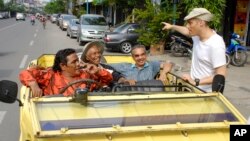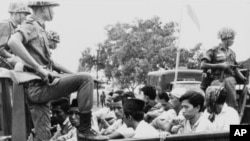WASHINGTON —
The bloody beginning of Indonesian President Suharto’s 32-year dictatorial reign is the focus of the Academy Award-nominated film The Act of Killing.
From the title alone, it’s clear this nominee for Best Documentary Feature pulls no punches in seeking clarity on the frenzy of terror that gripped the Southeast Asian nation during the mid-1960s.
“Of course, it’s a huge honor for us, but much more importantly, it’s a really important moment for the survivors and the victims of genocide in Indonesia,” said Joshua Oppenheimer, director of The Act of Killing.
“My hope is that the nomination will actually encourage the Indonesian government to finally acknowledge the moral catastrophe of the genocide.”
The mass bloodletting began in 1965-1966, as Suharto rose to power following the ouster of President Sukarno. An estimated 500,000 people were killed.
Said to target suspected communists, the victims also included ethnic Chinese, as well as leftists working as trade unionists, teachers and artists. The U.S. Central Intelligence Agency has described the bloodletting as “one of the worst mass murders of the 20th century.” But it is a genocide that is downplayed in most Indonesian history books.
Oppenheimer began the project with the intention of filming the survivors of the upheaval, and letting them tell their stories. But that quickly proved impossible.
“The army found out what we were doing,” he said. “The Indonesian army is stationed in every village, and in order to monitor, and ultimately, if needed, suppress the population, they found out what we were doing, and warned the survivors not to participate in the film.”
The survivors encouraged the film crew to seek out the perpetrators, hoping that their recollections would reveal the details of the deaths of their relatives.
It was a suggestion that Oppenheimer initially resisted.
“I was nervous at first to approach the perpetrators, but when I did, I found to my horror that every single one of them was open, every single one of them was boastful, and would recount the grisly details of the killings, often with smiles on their faces in front of their families, even their little grandchildren,” he said. “It’s as though I wandered into Germany 40 years after the Holocaust, only to find the Nazis still in power.”
The regime that was founded on crimes against humanity has never been held accountable. In fact, former death squad commanders are happy to boast about their role.
The film concentrates on one of them, Anwar Congo, who estimates he killed about 1,000 people. He takes the film crew to a roof of a building where he killed hundreds, and describes a method he used to lessen the amount of blood.
In another scene, Anwar acts as the victim of a killing. We then see him with his grandchildren. And finally, we see him coming to terms with the killings he committed many years ago.
Oppenheimer believes the present Indonesian government, and the Western countries which welcomed the Suharto takeover, should acknowledge the terrible events of the mid-1960s.
“We’d like to see the Indonesian government acknowledge the past,” he said. “But we’d like to see the U.S. government, the British government, the Australian government all acknowledge our collective role in supporting, participating in and ignoring these crimes.”
The U.S. has formally denied supplying aid to the Suharto forces. But the U.S. embassy in Indonesia encouraged and lauded the military’s actions in the genocide’s early stages. Academics and human rights groups say it also gave the army the names of thousands of Communist Party members.
The Jakarta Globe newspaper quoted Presidential spokesman for foreign affairs Teuku Faizasyah as saying the film “is simplifying a dark, complicated period of history.”
The film portrays Indonesia as a “'cruel and lawless nation,” Faizasyah said. “It must be remembered [that] Indonesia has gone through a reformation. Many things have changed.”
Not enough, apparently, for a group of 60 Indonesian crew members who opted not to list their names in the film's credits. Reflecting the sensitivity to the topic in Indonesia, an anonymous Jakarta-based co-director did not wish to publicly reveal his/her name.
While progress has been made to address the killings in the 16 years since the end Suharto’s death, a critical report by Indonesia’s human rights commission (Komnas HAM) has been rejected by the Attorney General and the Supreme Court as providing insufficient evidence.
The Academy Awards will be announced Sunday, March 2, in Los Angeles.
From the title alone, it’s clear this nominee for Best Documentary Feature pulls no punches in seeking clarity on the frenzy of terror that gripped the Southeast Asian nation during the mid-1960s.
“Of course, it’s a huge honor for us, but much more importantly, it’s a really important moment for the survivors and the victims of genocide in Indonesia,” said Joshua Oppenheimer, director of The Act of Killing.
“My hope is that the nomination will actually encourage the Indonesian government to finally acknowledge the moral catastrophe of the genocide.”
The mass bloodletting began in 1965-1966, as Suharto rose to power following the ouster of President Sukarno. An estimated 500,000 people were killed.
Said to target suspected communists, the victims also included ethnic Chinese, as well as leftists working as trade unionists, teachers and artists. The U.S. Central Intelligence Agency has described the bloodletting as “one of the worst mass murders of the 20th century.” But it is a genocide that is downplayed in most Indonesian history books.
Oppenheimer began the project with the intention of filming the survivors of the upheaval, and letting them tell their stories. But that quickly proved impossible.
“The army found out what we were doing,” he said. “The Indonesian army is stationed in every village, and in order to monitor, and ultimately, if needed, suppress the population, they found out what we were doing, and warned the survivors not to participate in the film.”
The survivors encouraged the film crew to seek out the perpetrators, hoping that their recollections would reveal the details of the deaths of their relatives.
It was a suggestion that Oppenheimer initially resisted.
“I was nervous at first to approach the perpetrators, but when I did, I found to my horror that every single one of them was open, every single one of them was boastful, and would recount the grisly details of the killings, often with smiles on their faces in front of their families, even their little grandchildren,” he said. “It’s as though I wandered into Germany 40 years after the Holocaust, only to find the Nazis still in power.”
The regime that was founded on crimes against humanity has never been held accountable. In fact, former death squad commanders are happy to boast about their role.
The film concentrates on one of them, Anwar Congo, who estimates he killed about 1,000 people. He takes the film crew to a roof of a building where he killed hundreds, and describes a method he used to lessen the amount of blood.
In another scene, Anwar acts as the victim of a killing. We then see him with his grandchildren. And finally, we see him coming to terms with the killings he committed many years ago.
Oppenheimer believes the present Indonesian government, and the Western countries which welcomed the Suharto takeover, should acknowledge the terrible events of the mid-1960s.
“We’d like to see the Indonesian government acknowledge the past,” he said. “But we’d like to see the U.S. government, the British government, the Australian government all acknowledge our collective role in supporting, participating in and ignoring these crimes.”
The U.S. has formally denied supplying aid to the Suharto forces. But the U.S. embassy in Indonesia encouraged and lauded the military’s actions in the genocide’s early stages. Academics and human rights groups say it also gave the army the names of thousands of Communist Party members.
The Jakarta Globe newspaper quoted Presidential spokesman for foreign affairs Teuku Faizasyah as saying the film “is simplifying a dark, complicated period of history.”
The film portrays Indonesia as a “'cruel and lawless nation,” Faizasyah said. “It must be remembered [that] Indonesia has gone through a reformation. Many things have changed.”
Not enough, apparently, for a group of 60 Indonesian crew members who opted not to list their names in the film's credits. Reflecting the sensitivity to the topic in Indonesia, an anonymous Jakarta-based co-director did not wish to publicly reveal his/her name.
While progress has been made to address the killings in the 16 years since the end Suharto’s death, a critical report by Indonesia’s human rights commission (Komnas HAM) has been rejected by the Attorney General and the Supreme Court as providing insufficient evidence.
The Academy Awards will be announced Sunday, March 2, in Los Angeles.





